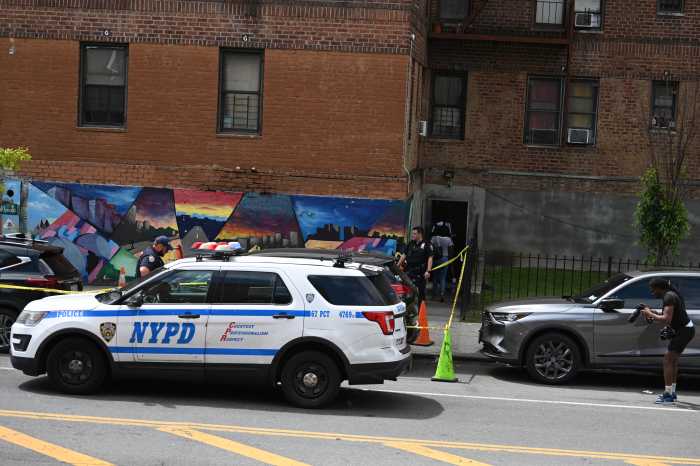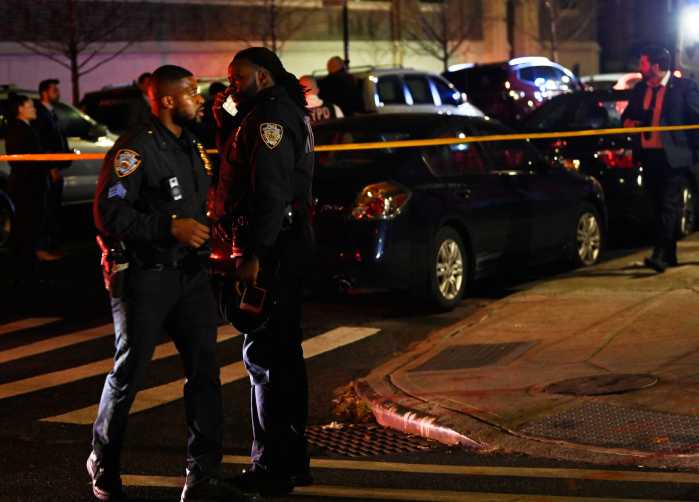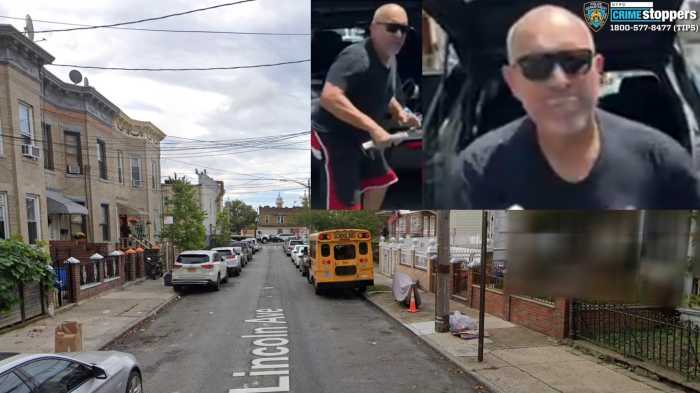
BY ZACH WILLIAMS | Local politicians, housing activists and tenants are urging landlord Jared Kushner to respect tenants’ rights through better communication and management of renovation work at 170-174 E. Second St.
Ceiling collapses, unannounced utility stoppages, incessant pounding and construction-related dust demonstrate Kushner’s lack of concern for tenants’ safety and quality of life, critics charge.
City Councilmember Rosie Mendez and Borough President Gale Brewer joined the tenants and Cooper Square Committee earlier this month outside the buildings, saying that they would hold Kushner accountable should the current situation continue.
Speaking at the Sept. 4 press conference, Cypress Dubin, a resident of 174 E. Second St., said, “Their pattern of responding after the fact to critical issues which could have been anticipated shows a complete lack of concern to prevent emergencies, maintain services and protect the daily lives of the tenants.”
A few weeks earlier, a ceiling had collapsed in an apartment occupied by Mark Fritsche at 170 E. Second St. That Aug. 13 incident followed a series of leaks in his apartment. The ceiling collapse could have been prevented had workers sent by building management been more careful, he said.
According to a Westminster City Living representative, building management tried to address the situation as soon as possible, but Fritsche barred access to his apartment. Westminster oversees about 600 residential buildings throughout Manhattan on Kushner’s behalf.
About 70 percent of residents moved out of 170-174 E. Second St. in the months after Kushner purchased the buildings for about $17 million at the end of last year. Those that currently remain, the Westminster spokesperson said, are simply instigating trouble in order to boost buyout offers.
Dubin is one of several tenants locked in ongoing legal battles with Westminster, which maintains the tenants are not rent-regulated and illegally occupy their longtime homes. Fritsche, president of a tenants association organized against Kushner, did receive a rent-stabilized lease after he proved that his apartment had been inappropriately deregulated by a previous landlord.
Mendez said at the Sept. 4 press conference that the remaining tenants at 170-174 E. Second St. should be able to count on the local community and government to prevent both their eviction and damage to their property and quality of life.
“You are not alone,” she told them.
Patrick Crosetto, C.O.O. of Kushner Companies, reiterated assurances from July that the situation in the buildings will improve despite the tenants. The company remains “proud of its strong track record of providing quality service to its residents,” Kushner said through the spokesperson.
The two East Village buildings were in disrepair upon their purchase in December, according to Westminster. A $3 million effort will update utilities and building amenities, Crosetto noted.
Air filters installed in 170 E. Second St. to mitigate dust subsequently disappeared, the company spokesperson added. The lack of mailboxes for two weeks in 174 E. Second St. was because the replacement process required U.S. Postal Service inspections, the spokesperson said, adding that tenants could get their mail from a local post office branch during the interim.
Building management has tried to make necessary repairs to the tenants’ apartments only to be denied entry, the spokesperson stated. Forty-eight-hour notice is given to residents before nonemergency utility shutdowns, he said.
The situation with tenants in the two buildings is an anomaly, Crosetto said.
“As always, we will continue our ongoing communication with all of our residents to address any of their concerns, despite the actions of a handful of illegal tenants who continue to sabotage our efforts for their own personal gain,” he said.
Tenant Julia Foote said her experience with the company has been fine at 201 E. Fourth St.
However, other Westminster tenants in four other East Village buildings tell a different story.
Ten of them said in interviews with The Villager that unannounced utility shutoffs, basement floods and sluggish responses to tenant complaints are part of the Westminster experience.
At 201 E. Second St. residents said their hot water was turned off two weeks ago without warning. Management assured them the problem would be resolved within a day, but two more days passed before service resumed, said resident Alessandro Harabin.
When he moved into the building in August, there was no knob on the sink, the bathtub did not drain and a window would not shut, he added.
“Basically, it’s really tough to get in touch with them,” another resident, Kate Curran, said of building management. “I wonder who is in charge of all this? Is anyone competent?”
Luxury amenities attracted four young professionals to move in together at 199 E. Fourth St. in 2013, when the building was still in the real estate portfolio of Ben Shaoul. Similar problems that the four men experienced under Shaoul continued after Westminster took over the building last year, including no winter heating, more flooding, mold and a robbery two months ago thanks to an unprotected window.
A promise to install protective bars within a week has yet to be fulfilled, they said. All told, the four men have lost about $12,000 worth of property to water damage and theft in their $6,100-per-month apartment, according to one of them, who requested anonymity since months remain on their lease.
Westminster furthermore did not let them know beforehand when it did address an ongoing mold problem caused by the flooding, according to another one of the men.
“We came home to a warning sign that said, ‘Don’t come in for 24 hours,’ ” he said.
Another tenant in the building, though, said she has not had to fight to remain rent-regulated, a contrast to suggestions from Mendez and others that Westminster targets rent-protected tenants. However, that has not made it any easier to have leaks fixed in her apartment, as her landlord, all the while, continues to encourage her to move out, she said, on condition of anonymity.
“[Westminster] doesn’t harass you,” she said. “Every few months they put a notice up for a buyout. They just don’t fix anything.”
The spokesperson said on Sept. 16 that buildings inevitably need repairs, and echoed previous assurances.
“Westminster management is always responsive,” he said, “and constantly works to improve the high-quality service it provides to its residents.”




































